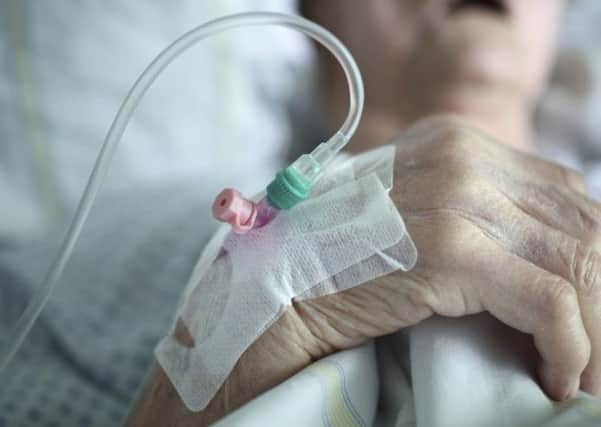Sick people wait toolong to see doctors, gettests and get beds


The Trust didn’t meet its own targets for reporting on all urgent diagnostic tests within two days, either. At least two urgent tests weren’t reported on for over 28 days.
Despite this the local health authority’s record was largely better than other Trusts across Northern Ireland.
Advertisement
Hide AdAdvertisement
Hide AdAccording to newly published data, at the end of June 2014, the Western Trust, did not meet its target of providing at least 80 per cent of outpatients with a consultant-led first time appointment within nine weeks.
Neither did it ensure that no outpatient was waiting for a first time appointment for more than 15 weeks. However, the local health authority was not unique in this.
Nowhere in Northern Ireland were these targets met. In fact, the Trust had the best record of any Trust.
The proportion of patients waiting longer than nine weeks here was 28.5 per cent, which was better than Belfast (46.4 per cent), the Northern (41.5 per cent), the Southern (30.7 per cent) and the South Eastern (30.4 per cent).
Advertisement
Hide AdAdvertisement
Hide AdThe proportion of patients waiting longer than 15 weeks was 11.7 per cent at the Western Trust.
Once again, this wasn’t the worst failure in Northern Ireland.
In Belfast the figure was 28.4 per cent (17,198) and in the Northern Trust the figure was 21.4 per cent (4,651).
Both the South Eastern (11.5 per cent; 2,649) and the Southern Trust’s (8.8 per cent; 1,959) had a better record, however.
DIAGNOSTIC SERVICES
Advertisement
Hide AdAdvertisement
Hide AdOnce patients are seen by a consultant they are often referred for diagnostic services. However, the Western Trust did not meet its waiting time targets in this area either.
Once again no patient is supposed to wait more than nine weeks for a diagnostic test. But in the Western Trust six per cent (526 out of 8,328) waited longer than nine weeks.
This was far better than most areas. At June 30, 2014, 32.3 per cent (7,968 out of 24,703) of patients at the Belfast Trust were waiting longer than nine weeks for a diagnostic service.
The comparable proportion at the Northern Trust was 18 per cent (2,942 out of 16,320), 12.5 per cent (1,822 out of 14,600) at the Southern Trust, and 11.7 per cent (976 out of 8,328) at the South Eastern Trust.
Advertisement
Hide AdAdvertisement
Hide AdAnd although a total of 16.7 per cent (22,402) diagnostic reports were completed in the Western Trust in June, the target of having all urgent diagnostic tests reported on within two days was not met.
This was the case across Northern Ireland.
Ninety-five per cent of urgent diagnostic tests were reported on within two days here in June.
The figure for routine tests reported on within two weeks was 97.3 per cent; and the figure for routine tests reported on within four weeks was 99.7 per cent.
In terms of actual cases, twenty-two urgent diagnostic reports took more than two weeks here; and two took more than four weeks.
WAITING FOR A BED
Advertisement
Hide AdAdvertisement
Hide AdOnce patients are diagnosed with an illness they are often faced with the prospect of waiting for a hospital bed.
But here - as elsewhere - the Trust did not meet the first element of the target that at least 80 per cent of patients should wait no longer than 13 weeks for inpatient or day case treatment.
The proportion of patients waiting longer than 13 weeks was 30.3 per cent at the Western Trust.
This compared with 47 per cent at the Belfast Trust; 25.9 per cent at the Southern Trust; 19.9 per cent at the South Eastern Trust and 18 per cent at the Northern Trust.
Advertisement
Hide AdAdvertisement
Hide AdAnd the proportion of patients waiting longer than 26 weeks - the maximum waiting time target - for a bed in the Western Trust was 8.8 per cent (681).
This compared with 16.4 per cent (3,913) at the Belfast Trust; 6 per cent (463) at the Southern Trust; 4.4 per cent (227) at the South Eastern Trust and 3.4 per cent (201) at the Northern Trust.